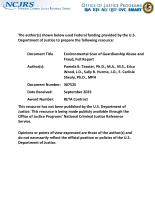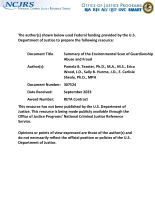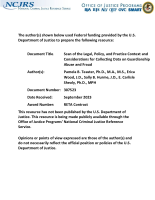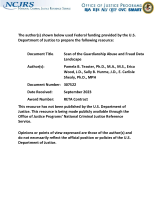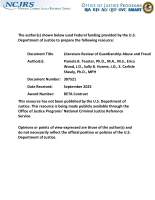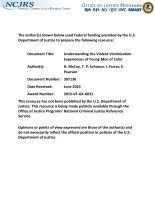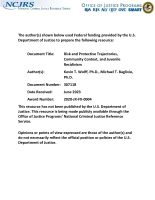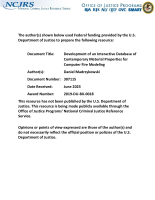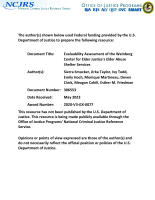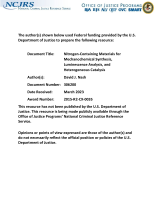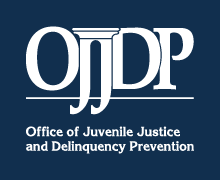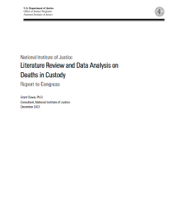Literature Reviews
Environmental Scan of Guardianship Abuse and Fraud, Full Report
Summary of the Environmental Scan of Guardianship Abuse and Fraud
Scan of the Legal, Policy, and Practice Context and Considerations for Collecting Data on Guardianship Abuse and Fraud
Scan of the Guardianship Abuse and Fraud Data Landscape
Literature Review of Guardianship Abuse and Fraud
A Nationwide Assessment of Jail Reentry Policies and Practices: A Two-Tiered Study of the Field
Meeting the Ongoing, Urgent, Unmet Needs of Uvalde Residents After the Robb Elementary School Shooting
Inclusive Research: Engaging People Closest to the Issue Makes for Better Science & Greater Impact; 2023 NIJ Research Conference Plenary
This panel will discuss what inclusive research is, how to conduct it, and what issues and challenges exist about engaging in it. “Inclusive research” has its history as a participatory research method designed to ensure people closest to the issue or problem under study are authentically engaged in the research process rather than simply being “research subjects.” While community-based participatory research has begun to take on greater prominence in the criminal justice realm, such efforts are largely confined to qualitative research inquiries.
See the YouTube Terms of Service and Google Privacy Policy
Metabolic and toxicological considerations of the opioid replacement therapy and analgesic drugs: methadone and buprenorphine
Trends in composition, collection, persistence, and analysis of IGSR and OGSR: A review
The Effectiveness of Prison Programming: A Review of the Research Literature Examining the Impact of Federal, State, and Local Inmate Programming on Post-Release Recidivism
Combating Elder Mistreatment Still Muddling-Not Yet Transformed
Understanding the Violent Victimization Experiences of Young Men of Color
Risk and Protective Trajectories, Community Context, and Juvenile Recidivism
Development of an Interactive Database of Contemporary Material Properties for Computer Fire Modeling
Evaluability Assessment of the Weinberg Center for Elder Justice's Elder Abuse Shelter Services
Nitrogen-Containing Materials for Mechanochemical Synthesis, Luminescence Analysis, and Heterogeneous Catalysis
Evaluation of Rubber Ball Grenades: Applications for Law Enforcement and Corrections
Aerial Flash Bangs: A Preliminary Study
Group Mentoring Model
National Institute of Justice Literature Review and Data Analysis on Deaths in Custody, Report to Congress
Economic Justice for Survivors of Intimate Partner Violence
See the YouTube Terms of Service and Google Privacy Policy


